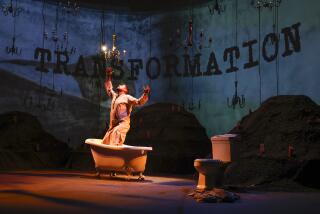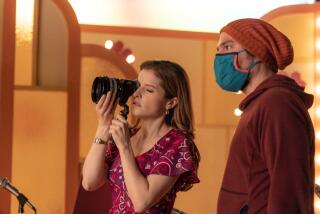Review: Increasingly aimless ‘The Trip to Spain’ gets a bit lost in La Mancha
- Share via
The paradox of “The Trip” movies is that they are always holding out the promise of new experiences — new cities to explore, new dishes to savor, new historic and literary landmarks to reflect upon — even as they adhere to a pattern of repetition and reassurance that is pretty much the opposite of novelty. Whether this is part of these movies’ irresistible charm or evidence of their limitations is entirely up to you, and probably beside the point in any case.
It would be a pleasure to report that “The Trip to Spain,” the third feature adapted from the Michael Winterbottom-directed sitcom, amounted to more than just another heavily improvised jaunt through some picturesque European countryside in the wittily self-aggrandizing company of Steve Coogan and Rob Brydon, gamely playing fictionalized versions of themselves. But it would also be a betrayal — of not only the audience’s expectations but also the spirit of these sometimes enchanting, invariably irritating proceedings.
You might well argue that this latest feature-length adventure is the least satisfying of the three, a sun-dappled test case for the law of diminishing returns, and you wouldn’t be wrong. But insofar as these adventures have always swirled around the subject of disappointment — a never-distant sense of anxiety and failure that no amount of high epicurean living can ultimately overcome — you might just as well say that the movie represents the fullest expression of the series’ ethos.
After touring England’s Lake District in “The Trip” (2010) and driving along the Amalfi Coast in “The Trip to Italy” (2014), Coogan and Brydon now hop a ferry to Spain, docking at Santander and then heading south through the Basque Country en route to Málaga. Brydon is once again filing restaurant reviews for the Observer, though this time the New York Times is in the assignment mix as well. Regardless, any writing they do is mere pretext for several days’ worth of haute cuisine, gorgeous scenery and palatial digs, padded out with dueling celebrity impressions, passive-aggressive jabs, surprise dream sequences and lots of downtime spent agonizing over their latest family dramas and career developments.
Even over plates of succulent-looking shrimp and Iberian chorizo, it takes Brydon barely 10 minutes to trot out his Michael Caine — a reliably funny bit that, while pretty hard to beat, is capably matched by Coogan’s lofty channeling of Ian McKellen and, most unexpectedly, a hilarious, pouty-lipped riff on Mick Jagger. (The vocal stylings of Robert De Niro, Marlon Brando and Russell Brand all make appearances as well.) And as always, the one-upsmanship inherent in all this rapid-fire mimicry allows the two men a playful outlet for their deeper, largely unspoken tensions.
Coogan may be the better-known star, especially with a pair of Oscar nominations under his belt for producing and writing “Philomena” (an accomplishment that, as Brydon points out, he never tires of bringing up). But Coogan, now in his 50s, is doing more writing than acting these days; his agent has abandoned him, and he’s infuriated that his latest passion-project screenplay has been assigned to an “up-and-coming” writer for a polish.
While Coogan experiences these setbacks, Brydon gets wind of a fresh opportunity, though he knows better than to flaunt or pursue it openly. He is, after all, the lowly Sancho Panza to Coogan’s puffed-up Don Quixote, to reference the Spanish literary touchstone whose spirit governs this rather less eventful picaresque. Like its predecessors, “The Trip to Spain” lets its characters bicker, but it always pulls them back from the brink of an actual flare-up. It’s never the last straw between these two.
At times you wish it were. The most painful scene involves an aimless, nonsensical riff whose meager comic value will be depleted only further by my attempt to describe it. Somewhere in the medieval town of Sos del Rey Católico, Coogan is showing off his knowledge of the Spanish Civil War, specifically the involvement of Moorish troops, only to keep getting interrupted by Brydon’s extended impression of Roger Moore. So you get a weak pun, a second-rate celebrity sendup and a lot of know-it-all windbaggery in one sequence — everything except the moment when somebody, preferably Coogan’s colleague Emma (Claire Keelan) tells them both to shut it, or at least does something besides sit around supplying amiable reaction shots.
The saving grace of “The Trip” movies is that all along they have displayed an essential measure of self-awareness, a barbed understanding of their characters’ privileged narcissism. The vicarious enjoyment of Europe’s visual and culinary splendors requires no defense, but the relentless focus on two desperately self-preening male egos is another matter (and here I am referring to the characters rather than the actors, who clearly enjoy letting us guess at what’s real and what isn’t).
A certain exhaustion sets in well before the end, collapsing any meaningful distinction between camera-hogging self-indulgence and critical scrutiny. It would be one thing if Coogan and Brydon’s banter masked or at least hinted at a deeper emotional core, as it did in the best moments of the earlier movies. But for long stretches here, they’re simply coasting, talking nonstop but never communicating; you may find yourself identifying with the restaurant patrons, who as always prove almost willfully indifferent to the rude and noisy celebrities in their midst.
“Like a door that keeps revolving / in a half-forgotten dream” goes the Noel Harrison “Windmills of Your Mind” cover that plays throughout, inspired by the mills and wind farms dotting the Castilla-La Mancha scenery. And like the shockingly tasteless non sequitur that pops up in the final scene, those lyrics more or less sum up the shrug of futility at the heart of “The Trip to Spain,” as two popular artists resign themselves to the knowledge that life’s fundamental emptiness becomes only more pronounced with age. It’s hard to fault the honesty of that sentiment, but even harder to forgive the laziness that brought them to it.
------------
‘The Trip to Spain’
No rating
Running time: 1 hour, 51 minutes
Playing: The Landmark, West Los Angeles
Movie Trailers
justin.chang@latimes.com | Twitter: @JustinCChang
More to Read
Only good movies
Get the Indie Focus newsletter, Mark Olsen's weekly guide to the world of cinema.
You may occasionally receive promotional content from the Los Angeles Times.









